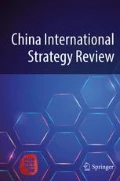Abstract
Of all the historical precedents that have been invoked in recent years to make sense of US–China relations, which is the most suggestive? This article argues that the Cold War analogy, which frames the US–Soviet strategic rivalry between 1947 and 1989 as a power-cum-ideological struggle, fits the bill best. Yet because analogical reasoning tends to be a hazardous intellectual enterprise, it is necessary to “test” the inferences derived from the Cold War 1.0 analogy against the current trajectory of US–China relations. This article offers some suggestions on how to go about performing such tests.
Similar content being viewed by others
References
Allison, Graham. 2017. Destined for war: Can America and China escape Thucydides’ Trap?. Boston: Houghton Mifflin Harcourt.
Allison, Graham, Robert D. Blackwill, and Ali Wyne. 2013. Lee Kuan Yew: The Grand Master’s Insights on China, the United States, and the World. Cambridge: MIT Press.
Betts, Richard. 1993–1994. Wealth, power and instability: East Asia and the United States after the Cold War. International Security 18 (3): 34–77.
Bloomberg News. 2019. Kissinger says US and China in ‘Foothills of a Cold War’. https://www.bloomberg.com/news/articles/2019-11-21/kissinger-says-u-s-and-china-in-foothills-of-a-cold-war. Accessed 17 Jan 2020.
Bottelier, Th.W. 2017. Of once and future kings: rethinking the Anglo-American analogy in the rising powers debate. The International History Review 39 (5): 751–769.
Chan, Steve. 2008. China, the U.S., and the power-transition theory: a critique. London: Routledge.
Copeland, Dale. 2014. Economic Interdependence and War. Princeton: Princeton University Press.
Fischer, David Hackett. 1970. Historians’ Fallacies. New York: Harper and Row.
Foroohar, Rana. 2019. Consciously decoupling the US economy. The Financial Times. https://www.ft.com/content/f23d8854-11fa-11ea-a225-db2f231cfeae. Accessed 17 Jan 2020.
Lowy Institute. 2019. Asia Power Index 2019. https://power.lowyinstitute.org/downloads/Lowy-Institute-Asia-Power-Index-2019-Key-Findings.pdf. Accessed 17 Jan 2020.
Khong, Yuen Foong. 1992. Analogies at war: Korea, Munich, Dien Bien Phu, and the Vietnam Decisions of 1965. Princeton: Princeton University Press.
Khong, Yuen Foong. 2019. Power as prestige in world politics. International Affairs 95 (1): 119–142.
Layne, Christopher. 2018. The sound of Distant Thunder: The Pre-World War I Anglo-German Rivalry as a Model for Sino-American Relations in the Early 21st Century. In Asle Toje ed. Will China’s rise be peaceful? 179–202. Oxford: Oxford University Press.
Lee, Kai-Fu. 2018. AI Superpowers: China, Silicon Valley, and the New World Order. Boston: Houghton Mifflin Harcourt.
Leffler, Melvyn P. 2019a. China Isn’t the Soviet Union. Confusing the two is dangerous. The Atlantic. https://www.theatlantic.com/ideas/archive/2019/12/cold-war-china-purely-optional/601969/. Accessed 17 Jan 2020.
Leffler, Melvyn P. 2019b. Avoiding Another Cold War. China International Strategy Review. https://doi.org/10.1007/s42533-019-00027-6.
May, Ernest. 1973. “Lessons” of the past: the use and misuse of history in American foreign policy. New York: Oxford University Press.
Mearsheimer, John. 2010. The gathering storm: China’s challenge to US power in Asia. The Chinese Journal of International Politics 3 (4): 381–396.
Mearsheimer, John, and Stephen Walt. 2016. The case for offshore balancing. Foreign Affairs (July/August): 70–83.
Neustadt, Richard, and Ernest May. 1986. Thinking in time: the uses of history for decision-makers. New York: Free Press.
Nye, Joseph. 2012. The twenty-first century will not be a ‘post-American’ world. International Studies Quarterly 56 (1): 215–217.
Petrova, Magdalena. 2018. We traced what it takes to make an iPhone, from its initial design to the components and raw materials needed to make it a reality. CNBC. https://www.cnbc.com/2018/12/13/inside-apple-iphone-where-parts-and-materials-come-from.html. Accessed 17 Jan 2020.
Pew Research Center. 2015. Balance of Power Report. https://www.pewresearch.org/global/2015/06/23/2-views-of-china-and-the-global-balance-of-power/. Accessed 17 Jan 2020.
Prime Minister’s Office Singapore. 2019. https://www.pmo.gov.sg/Newsroom/DPM-Heng-Swee-Keat-at-the-ST-Global-Outlook-Forum. Accessed 17 Jan 2020.
Rosecrance, Richard, and Steven Miller. 2015. The next great war? The roots of World War I and the risk of U.S.-China conflict. Cambridge: MIT Press.
Sapolsky, Harvey M. 2019. Continuity and change in a Second Cold War. China International Strategy Review. https://doi.org/10.1007/s42533-019-00021-y.
Swanson, Ana, and Alan Rappeport. 2018. Chill remains between China and United States in latest trade talks. New York Times. https://www.nytimes.com/2018/08/23/us/politics/us-china-trade-talks.html. Accessed 17 Jan 2020.
Waltz, Kenneth. 1979. Theory of international politics. Boston: Addison-Wesley.
Wolf, Martin. 2019. The looming 100-year US-China conflict. The Financial Times. https://www.ft.com/content/52b71928-85fd-11e9-a028-86cea8523dc2. Accessed 9 Jan 2019.
Zhao, Minghao. 2019. Is a new cold war inevitable? Chinese perspectives on US-China strategic competition. The Chinese Journal of International Politics 12 (3): 371–394.
Funding
This research was supported by National University of Singapore (Grant Start Up Grant, WBS R603-000-191-133).
Author information
Authors and Affiliations
Corresponding author
Appendix
Rights and permissions
About this article
Cite this article
Khong, Y.F. The US, China, and the Cold War analogy. China Int Strategy Rev. 1, 223–237 (2019). https://doi.org/10.1007/s42533-020-00034-y
Received:
Accepted:
Published:
Issue Date:
DOI: https://doi.org/10.1007/s42533-020-00034-y


